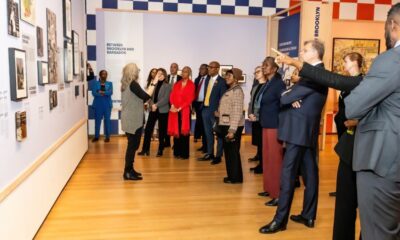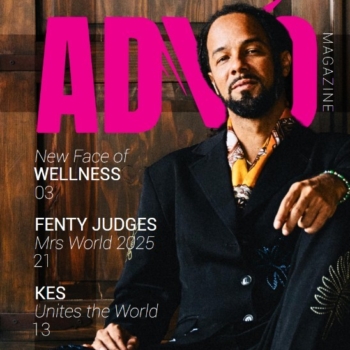Article by David Harris
Wendell Coppin attraction to cricket began when he was a boy growing up in St Patrick, Christ Church in the 1970s and continued throughout his life.
Since 2023, Coppin has held the post of manager of cricket operations and development of the Barbados Cricket Association (BCA), prior to his appointment to that position; he was a professional cricketer in England, and worked for Cricket West Indies (CWI) and the International Cricket Council; he was also the cricket master at one of the oldest schools in the United Kingdom, and taught physical education at two secondary schools in Barbados.
“Falling in love with cricket was easy because my dad played cricket for Searles; and all of the club’s kit was kept at our house, there was another Barbados Cricket League (BCL) club in the village called Kent, and several other BCL teams were within the environs of St Patrick which was a hive of sporting and cultural activities. I grew up around Sylvester Clarke, Collis King, and Ezra Moseley ( former Barbados and West Indies cricketers) and Roddy Estwick who represented Barbados, cricket was a focal point in my life from the time I was a child”, Coppin told Advo Magazine.
Coppin, a fast bowler was called to trials for the Barbados Under-19 team in 1982 at the age of 15 after a successful season for Princess Margaret in the now defunct Ronald Tree Competition, along with Roland Holder, the former Barbados and West Indies batsman, and Mark Alleyne the ex-England’s all-rounder who had performed exceptionally for Combermere and Harrison College respectively during the season.
“I was not included in the Barbados Under-19 side in 1982; but two years later, I was selected and that set the professional foundation for me. In 1985, I was selected for the West Indies Under-19 team that played against England, which created the path for my career as a professional cricketer. The former England fast bowler Bob Willis was the manager of the team and he recommended me for a trial with his county Warwickshire. I went to England shortly after playing for the West Indies youth team and played for Farnworth Social Circle CC in the Bolton League. Roddy was the professional at the club and he was leaving to go to South Africa and he recommended me as his replacement”, Coppin said.
According to Coppin, being a professional cricketer in England at the age of 20 for the time was a daunting task, and for the first three months of his stint he was a little boy but grew up in the second part of the season.
“I remember one of my teammates saying that by the second half of the season Wendell Coppin the man had arrived, by that time, I had become more aggressive and confident on the field, and that in itself was the start of my career as a professional cricketer. I also played in the Lancashire League, the Central Lancashire League, and in the Thames Valley League for Maidenhead and Bray; after the president of club the broadcaster Michael Parkinson saw me playing at a festival in Scarborough and insisted that I join the club”, Coppin said.
He also played minor county cricket for Norfolk, second team cricket for Hampshire, and ended his professional career playing in the Surrey Championship for Sutton. After he stopped playing professional cricket, Coppin attended the University of Leicester and graduated with a Bachelor of Education (B.Ed.) and was the master in charge of cricket at Wisbech Grammar School one of the oldest schools in England.
“Teaching at Wisbech was a wonderful experience, I was in charge of all matters related to cricket at the school. At the end of every school year, we had a sports week and cricket became the highlight of the week. One year, I organized a match between a Rest of the World team captained by the former West Indies batsman Alvin Kallicharran and the school team. Sir Gordon Greendige, Roger Harper, and several Kenyan cricketers that subsequently represented their country played in the match. The sports week became a major event in the area and was covered by several of the major media outlets in the area. After I returned home, I taught at St Michael School, and Providence School; even though – I love teaching, there is something about cricket that lures me back to it”.
Coppin worked as sessional coach with the National Sports Council (NSC) from 2001 to 2004 before joining CWI as a territorial development officer (TDO) in 2004.
“I joined CWI as a territorial development officer in 2004 and worked in that position for five years. My job as entails looking after all of the development programs in Barbados; and managing and monitoring the workload of the Barbadian cricketers that represented the West Indies. At that time four Barbadian fast bowlers Tino Best, Fidel Edwards, Corey Collymore and Pedro Collins were playing for the West Indies; I managed their workload and reported back to the to the head coach of the team, because of my professional background, and I was heavily involved in CWI’s coaching educational program. I conducted courses for coaches across the region, and played a major role BCA’s program to certify coaches and assign them to clubs throughout the island”, Coppin said.
He left CWI in 2009 and joined the ICC as the development officer for the Americas covering 17 countries from Canada to the Falkland Islands, including the United States, Mexico, Peru, Argentina, Brazil and the Turks and Caicos Islands.
“in that capacity, I was involved in assisting those countries with every aspect of cricket development, my job included teaching budding cricketers how to play the game. Advising the associations how to receive financial assistance from the ICC for their cricket development programs, and advising the the cricket associations on how to create the correct systems to govern the sport. So, it was quite board base in term of assisting the developing countries in our hemisphere to improve their cricket. One of my greatest achievements was going into a town in the eastern part of Costa Rico called Limon, and setting up a program at Earth University with seven primary school that has continued with over 2500 children at 14 schools today. To see that project come to fruition beginning with a small group of kids made me felt good. Working in Limon was a wonderful experience; there were several people of Jamaican descent living in the town, and even though I could not speak Spanish, I was still able to communicate with them because they consider me to be one of their own- it was fantastic”, Coppin said.
During his tenure at the ICC, Coppin started a women’s cricket program in Brazil at a university in Brasilia with Matthew Featherstone, a former county cricketer for Kent who is a resident of Brazil.
“We started that program and it is still in existence; women’s cricket is now played in Brazil on a grand scale. Helping Belize to qualify for an ICC Division One regional tournament and play in a World Cup qualifier was a memorable moment for me. Working as a development officer for the ICC in the Americas was an exciting period in my life; going into South American where football is king and seeing the excitement and enthusiasm among people when I talked to them about cricket was remarkable”, he added.
While working at the ICC, Coppin who has level three coaching certificates from Cricket Australia and the England and Wales Cricket Board was a coaching assessment officer: “I was part of a 12-man panel that reviewed coaching education courses around the world, I evaluated the Pakistan coaching product, and the Australian level one, two and three courses”.
In his current role as cricket operations and development manager of the BCA, Coppin is in charge of the largest department in the organization.
“The operations department is the life blood of the association, it is made up of five operation officers, six full-time coaches, and the ground staff. In addition to the full-time members of the ground staff, a number of casual members are required for the various programs that takes place under the auspices of the BCA. The organization has transition from the days when we had two teams, the senior men’s side and an Under-19 team. There are several cricket programs for the various junior boys’ teams, we have a young Gems, and a women’s Under-19 and senior teams’ programs. We also have programs for the senior Barbados men’s team and the A team; therefore, we hire extra coaches and ground staff to made sure the various programs which takes place at several different venues throughout the island are run smoothly, because they are national programs and have to be of a certain standard”, Coppin said.
He explained that sometimes is job can be very taxing because several things are taking place at the same time: “My job can be taxing but it is never difficult because there is always a solution to any issues that arise. I always try to find a way to better whatever we have to do, and if errors are made how we can correct them and perform better”, he explained.
Last year, the operations department played a key role when Kensington Oval was the venue for several matches and the final of the ICC Men’s T20 World Cup.
” Ensuring that the field was in pristine condition was the major task of department during the World Cup, and we worked extremely hard to ensure that grounds were of world class standard for the prestigious event”, the cricket administrator said.

 Business4 weeks ago
Business4 weeks ago
 International3 weeks ago
International3 weeks ago
 Local3 weeks ago
Local3 weeks ago
 Tourism3 weeks ago
Tourism3 weeks ago
 Environment3 weeks ago
Environment3 weeks ago
 International4 weeks ago
International4 weeks ago
 Government3 weeks ago
Government3 weeks ago
 Features4 weeks ago
Features4 weeks ago























